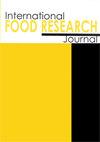UV-visible light spectra of Clitoria ternatea L. flower extract during aqueous extraction and storage
IF 1
4区 农林科学
Q4 FOOD SCIENCE & TECHNOLOGY
引用次数: 0
Abstract
Spectrophotometry is a widespread method to observe anthocyanin content, colour quality, and chemical change of an anthocyanin-source extract. The spectrogram may vary due to the extraction method, and may also change over time. The present work studied the spectrophotometric varieties of butterfly pea flower (Clitoria ternatea L.) extract using the cell wall disruption method (mortar-pestle: MP; freezing-thawing: FT; 6 min steam blanching: SB; and 6 min hot water blanching: WB) and aqueous extraction temperature (30, 45, and 60°C) for 210 min. The absorbance was monitored every 30 min. The UV-vis light absorbance shift of the extract during storage at 30°C (E30) and 50°C (E50) was also evaluated. Both SB and WB resulted in extracts with a similar spectrogram and effectively suppressed the brown colour development (browning index: 0.27 ± 0.02 and 0.3 ± 0.01, respectively). The cell wall disruption method did not affect the total anthocyanin. Therefore, the blanching process before extraction was appropriate. The most effective extraction parameter yielding the highest anthocyanin and phenolic substances were 60°C for 30 min. The E50 and E30 performed differently during storage. They showed different colour degradation patterns. For the bathochromic shift, the absorbance increased at 265 nm (phenolic substances), and that at 310 nm (acyl groups) occurred in E50. These three unique characteristics might indicate the event of intermolecular co-pigmentation between or among anthocyanin molecules that led to higher anthocyanin stability at 50°C (t0.5 24.78 days) than at 30°C (t0.5 14.28 days).阴蒂花提取物水溶液提取和贮藏过程中的紫外-可见光光谱
分光光度法是一种广泛用于观察花青素源提取物的含量、颜色质量和化学变化的方法。谱图可能因提取方法而变化,也可能随时间而变化。采用细胞壁破坏法(臼杵法:MP;冻融:英国《金融时报》;6分钟蒸汽焯水:SB;热水烫6 min (WB)和水浸温度(30、45、60℃)210 min。每隔30 min监测吸光度。同时评估提取物在30°C (E30)和50°C (E50)下储存期间的紫外-可见光吸光度变化。褐变指数(褐变指数)分别为0.27±0.02和0.3±0.01。细胞壁破坏法对总花青素含量无明显影响。因此,提取前的焯水工艺是合适的。花青素和酚类物质提取率最高的提取参数为60°C,提取时间为30 min。E50和E30在贮藏过程中的表现不同。它们呈现出不同的颜色退化模式。对于色移,E50在265 nm处(酚类物质)吸光度增加,在310 nm处(酰基)吸光度增加。这三个独特的特征可能表明花青素分子之间或分子间的共着色事件,导致花青素在50°C (t0.5 24.78天)下的稳定性高于30°C (t0.5 14.28天)。
本文章由计算机程序翻译,如有差异,请以英文原文为准。
求助全文
约1分钟内获得全文
求助全文
来源期刊

international food research journal
Agricultural and Biological Sciences-Food Science
CiteScore
1.40
自引率
0.00%
发文量
75
期刊介绍:
The International Food Research Journal (IFRJ) publishes papers in English, six (6) issues a year with the coverage of:
Food Science and Technology
Nutrition and Dietetics
Agriculture, multidisciplinary
Chemistry, multidisciplinary
The scope of the Journal includes:
Food Science, Food Technology and Food Biotechnology
Product Development and Sensory Evaluation
Food Habits, Nutrition, and Health
Food Safety and Quality
Food Chemistry, Food Microbiology, Food Analysis and Testing
Food Engineering
Food Packaging
Food Waste Management
Food Entrepreneur
Food Regulatory
Post-Harvest Food Management
Food Supply Chain Management
Halal Food and Management
 求助内容:
求助内容: 应助结果提醒方式:
应助结果提醒方式:


